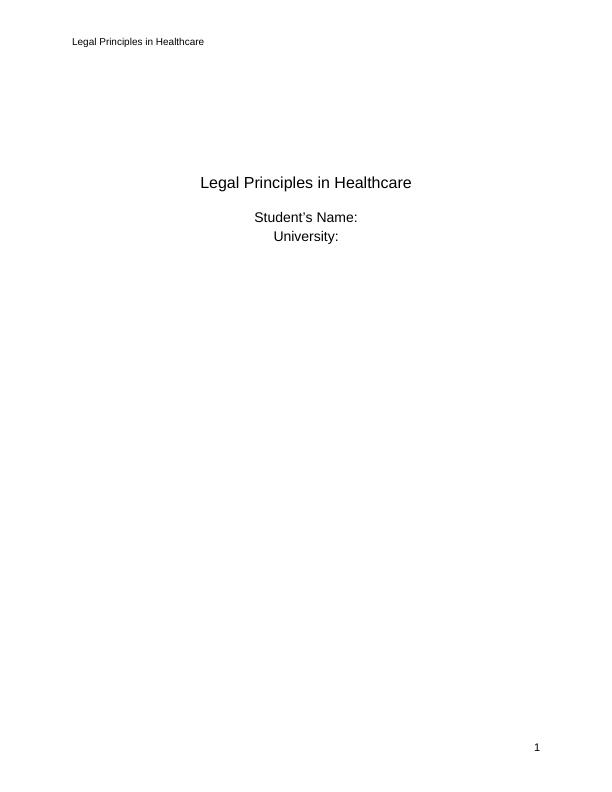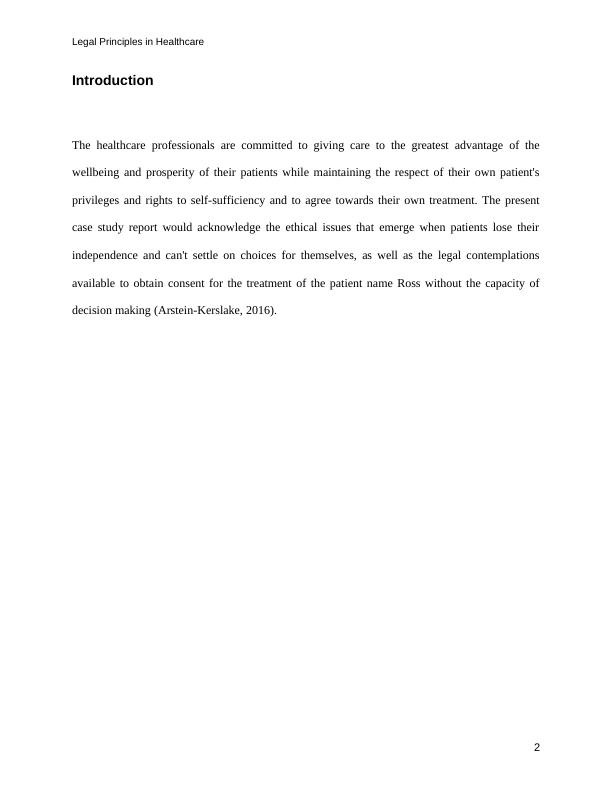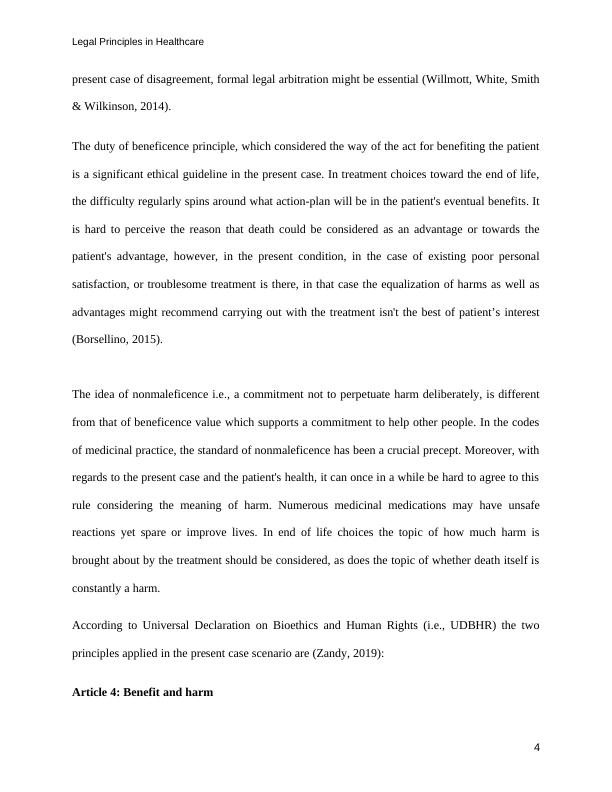Legal Principles in Healthcare | Study
Added on 2022-09-09
14 Pages3398 Words48 Views
Legal Principles in Healthcare
Legal Principles in Healthcare
Student’s Name:
University:
1
Legal Principles in Healthcare
Student’s Name:
University:
1

Legal Principles in Healthcare
Introduction
The healthcare professionals are committed to giving care to the greatest advantage of the
wellbeing and prosperity of their patients while maintaining the respect of their own patient's
privileges and rights to self-sufficiency and to agree towards their own treatment. The present
case study report would acknowledge the ethical issues that emerge when patients lose their
independence and can't settle on choices for themselves, as well as the legal contemplations
available to obtain consent for the treatment of the patient name Ross without the capacity of
decision making (Arstein-Kerslake, 2016).
2
Introduction
The healthcare professionals are committed to giving care to the greatest advantage of the
wellbeing and prosperity of their patients while maintaining the respect of their own patient's
privileges and rights to self-sufficiency and to agree towards their own treatment. The present
case study report would acknowledge the ethical issues that emerge when patients lose their
independence and can't settle on choices for themselves, as well as the legal contemplations
available to obtain consent for the treatment of the patient name Ross without the capacity of
decision making (Arstein-Kerslake, 2016).
2

Legal Principles in Healthcare
Ethical Issues
The choices which will be made by Rachel must adjust to the "best interest" standard as well as
the substituted judgment. The value considered by Rachel is the best interest standard for Ross in
the present case, the choice will be made as per what is viewed as generally useful for the
patient. This is immediate use of the value of beneficence as well as proportionality with
increased benefits while maintaining a strategic distance from harm. The value of the substituted
judgment standard is considered by Chandler in the present situation which means to execute the
subjective preferences (İbrahimoğlu, 2017). He thinks about the patient's past conduct,
articulations, or decisions. The degree of evidence required to express that the patient had a
particular inclination might be pretty much strict and change as per the sort of choice made.
Chandler thinks that substituted judgment might be ideal however is relevant just when patients
have communicated their desires. However, in the present case, the patient has expressed his
wish to not cooperate with the treatment and has not provided any consent regarding that
(İbrahimoğlu, 2017).
Literature supported the value of social forces is considered more that will in general concentrate
on medicinal services choices and this inclination lessens the ethical status of the patient. Thus,
the individuals who care for Ross need to accommodate measures to request consent and to take
care of potential maltreatment of control over him when ethical disagreements happen as in the
present scenario. This is especially significant in regards to the commencement, withholding, or
withdrawing of life-continuing treatment. Furthermore, the mechanisms to determine ethical
clashes incorporate extra medicinal consultation, momentary guiding or meeting for family, the
management of the case or comparative multidisciplinary conference or potentially consultation
with people prepared in clinical ethics or an emergency clinic-based ethical council. In the
3
Ethical Issues
The choices which will be made by Rachel must adjust to the "best interest" standard as well as
the substituted judgment. The value considered by Rachel is the best interest standard for Ross in
the present case, the choice will be made as per what is viewed as generally useful for the
patient. This is immediate use of the value of beneficence as well as proportionality with
increased benefits while maintaining a strategic distance from harm. The value of the substituted
judgment standard is considered by Chandler in the present situation which means to execute the
subjective preferences (İbrahimoğlu, 2017). He thinks about the patient's past conduct,
articulations, or decisions. The degree of evidence required to express that the patient had a
particular inclination might be pretty much strict and change as per the sort of choice made.
Chandler thinks that substituted judgment might be ideal however is relevant just when patients
have communicated their desires. However, in the present case, the patient has expressed his
wish to not cooperate with the treatment and has not provided any consent regarding that
(İbrahimoğlu, 2017).
Literature supported the value of social forces is considered more that will in general concentrate
on medicinal services choices and this inclination lessens the ethical status of the patient. Thus,
the individuals who care for Ross need to accommodate measures to request consent and to take
care of potential maltreatment of control over him when ethical disagreements happen as in the
present scenario. This is especially significant in regards to the commencement, withholding, or
withdrawing of life-continuing treatment. Furthermore, the mechanisms to determine ethical
clashes incorporate extra medicinal consultation, momentary guiding or meeting for family, the
management of the case or comparative multidisciplinary conference or potentially consultation
with people prepared in clinical ethics or an emergency clinic-based ethical council. In the
3

Legal Principles in Healthcare
present case of disagreement, formal legal arbitration might be essential (Willmott, White, Smith
& Wilkinson, 2014).
The duty of beneficence principle, which considered the way of the act for benefiting the patient
is a significant ethical guideline in the present case. In treatment choices toward the end of life,
the difficulty regularly spins around what action-plan will be in the patient's eventual benefits. It
is hard to perceive the reason that death could be considered as an advantage or towards the
patient's advantage, however, in the present condition, in the case of existing poor personal
satisfaction, or troublesome treatment is there, in that case the equalization of harms as well as
advantages might recommend carrying out with the treatment isn't the best of patient’s interest
(Borsellino, 2015).
The idea of nonmaleficence i.e., a commitment not to perpetuate harm deliberately, is different
from that of beneficence value which supports a commitment to help other people. In the codes
of medicinal practice, the standard of nonmaleficence has been a crucial precept. Moreover, with
regards to the present case and the patient's health, it can once in a while be hard to agree to this
rule considering the meaning of harm. Numerous medicinal medications may have unsafe
reactions yet spare or improve lives. In end of life choices the topic of how much harm is
brought about by the treatment should be considered, as does the topic of whether death itself is
constantly a harm.
According to Universal Declaration on Bioethics and Human Rights (i.e., UDBHR) the two
principles applied in the present case scenario are (Zandy, 2019):
Article 4: Benefit and harm
4
present case of disagreement, formal legal arbitration might be essential (Willmott, White, Smith
& Wilkinson, 2014).
The duty of beneficence principle, which considered the way of the act for benefiting the patient
is a significant ethical guideline in the present case. In treatment choices toward the end of life,
the difficulty regularly spins around what action-plan will be in the patient's eventual benefits. It
is hard to perceive the reason that death could be considered as an advantage or towards the
patient's advantage, however, in the present condition, in the case of existing poor personal
satisfaction, or troublesome treatment is there, in that case the equalization of harms as well as
advantages might recommend carrying out with the treatment isn't the best of patient’s interest
(Borsellino, 2015).
The idea of nonmaleficence i.e., a commitment not to perpetuate harm deliberately, is different
from that of beneficence value which supports a commitment to help other people. In the codes
of medicinal practice, the standard of nonmaleficence has been a crucial precept. Moreover, with
regards to the present case and the patient's health, it can once in a while be hard to agree to this
rule considering the meaning of harm. Numerous medicinal medications may have unsafe
reactions yet spare or improve lives. In end of life choices the topic of how much harm is
brought about by the treatment should be considered, as does the topic of whether death itself is
constantly a harm.
According to Universal Declaration on Bioethics and Human Rights (i.e., UDBHR) the two
principles applied in the present case scenario are (Zandy, 2019):
Article 4: Benefit and harm
4

End of preview
Want to access all the pages? Upload your documents or become a member.
Related Documents
Legal and Ethical Issues in Healthcare: Principles, Struggles, and Implicationslg...
|10
|761
|323
Medico-Legal and Ethical Issues in Healthcarelg...
|10
|2827
|101
Case Study with Legal Issueslg...
|10
|2575
|318
Law in Nursing - Assignmentlg...
|9
|2965
|32
Professional Identify: Legal and Ethical Issues in Nursing Practicelg...
|8
|1925
|61
Applying the Four Principles: Case Studylg...
|4
|1937
|403
